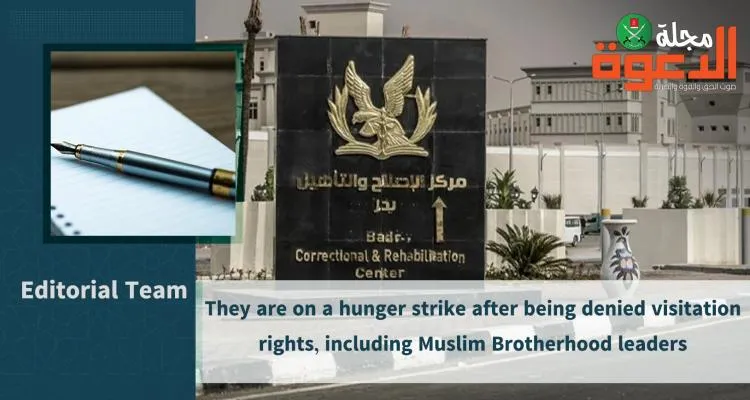

They are on a hunger strike after being denied visitation rights, including Muslim Brotherhood leaders
In Sector 2 of Badr 3 Prison, a silent tragedy persists! Only the echoes of the strike and the pain of waiting are heard! Since June 20, the prison corridors have seen an increase in tension among political detainees, especially after some of them started an open-ended hunger strike to protest their denial of family visits for over a decade.
Human rights activist Mosaad Al-Barbari revealed disturbing details about what is happening behind the walls of Sector 2 of Badr 3 Prison, where 58 detainees are held, most of whom are leaders of the Muslim Brotherhood. The situation escalated after they demanded their right to visit and see their families. Because the prison administration refused to respond to their requests and in accordance with the directives of the National Security Agency, the detainees then blocked the surveillance cameras inside their cells.
In response, the Prison Service launched a large-scale search and seizure campaign within the Strip, confiscating the contents of the cells, including papers and personal items, while only keeping the prison jackets. The detainees then decided to begin an open hunger strike starting June 20, with participation from several Brotherhood leaders. They are:
Dr. Mohamed El-Beltagy
Dr. Abdel Rahman El-Barr
Osama Morsi, son of President Mohamed Morsi
Professors Khaled El-Azhari, Amin El-Sayrafi, Asaad El-Shiha, and Yousry Antar; MP Amr Zaki, MP Sobhi Saleh, and Engineer Gehad El-Haddad.
As the administration continued to ignore their demands, some attempted suicide, with the most serious incident occurring on Friday, July 4. Detainee Ahmed Sherif, who was sentenced to life imprisonment, attempted suicide on Tuesday, July 8, by slashing his wrist in protest of being prevented from seeing his children. He was later treated at the prison hospital.
Amid the escalating events, the Assistant Minister of Interior for Prison Affairs visited and responded to the detainees' demands by saying, "The last thing we can do is bring you an order of medicine and some food, but I can't do anything more than that!"
On July 5, some detainees tried to present their health conditions to Judge Mohamed El-Saeed El-Sherbiny during a court session, but he refused. Their request was denied, and the next day, the Prison Service launched a new, stricter confiscation campaign within the sector, seizing all personal belongings, including Qurans.
The State Security officer in charge of the prison and the investigations department also threatened detainees in other sectors, warning that anyone who shows solidarity with the detainees in Sector 2 would be transferred with them.
The hunger-striking detainees hold the Ministry of Interior, the Prison Service, and the National Security Agency fully responsible for their lives, mainly since they include the elderly and those suffering from chronic illnesses.

